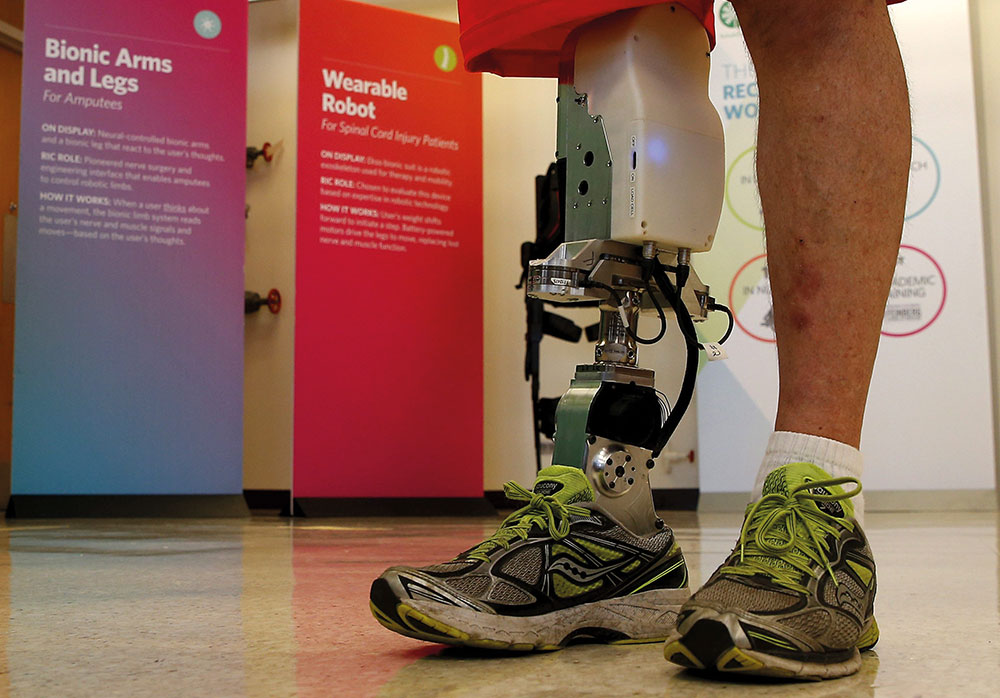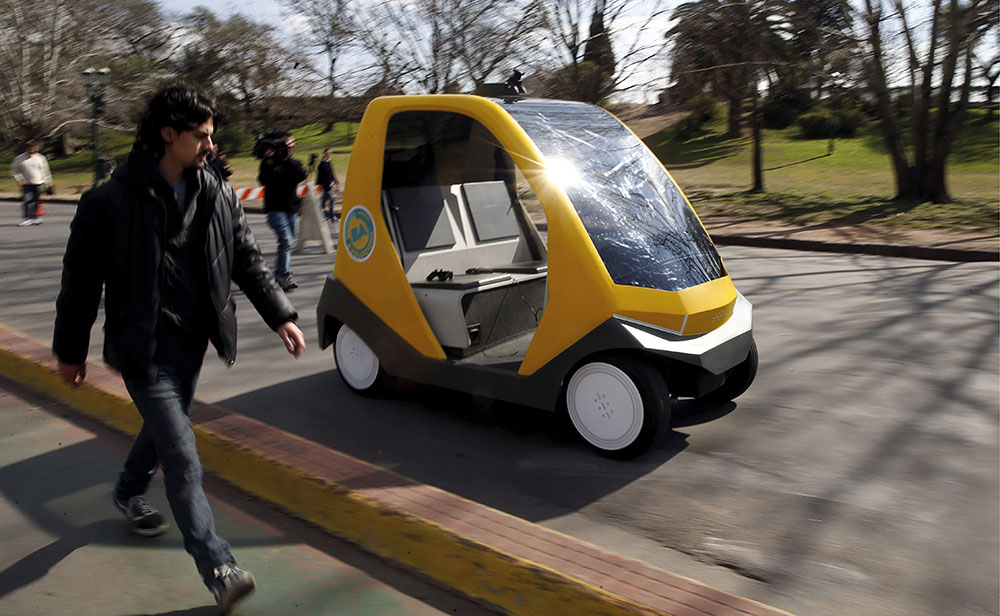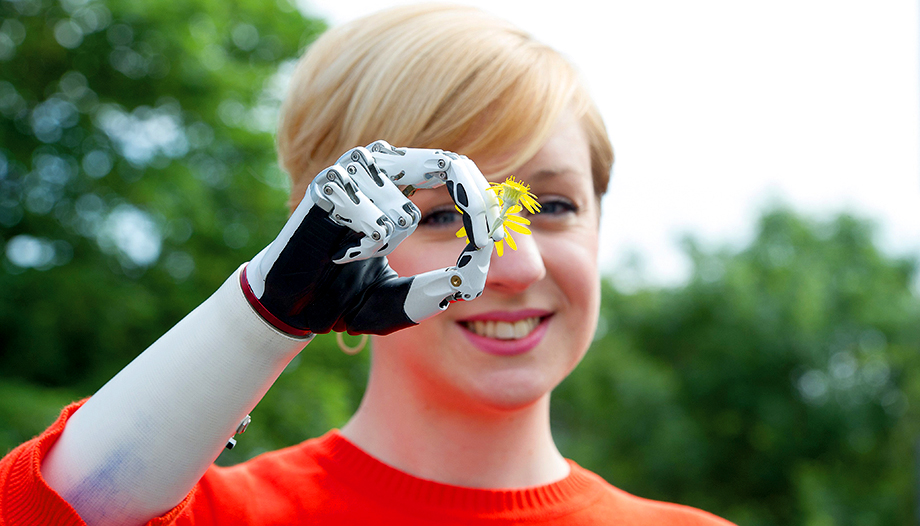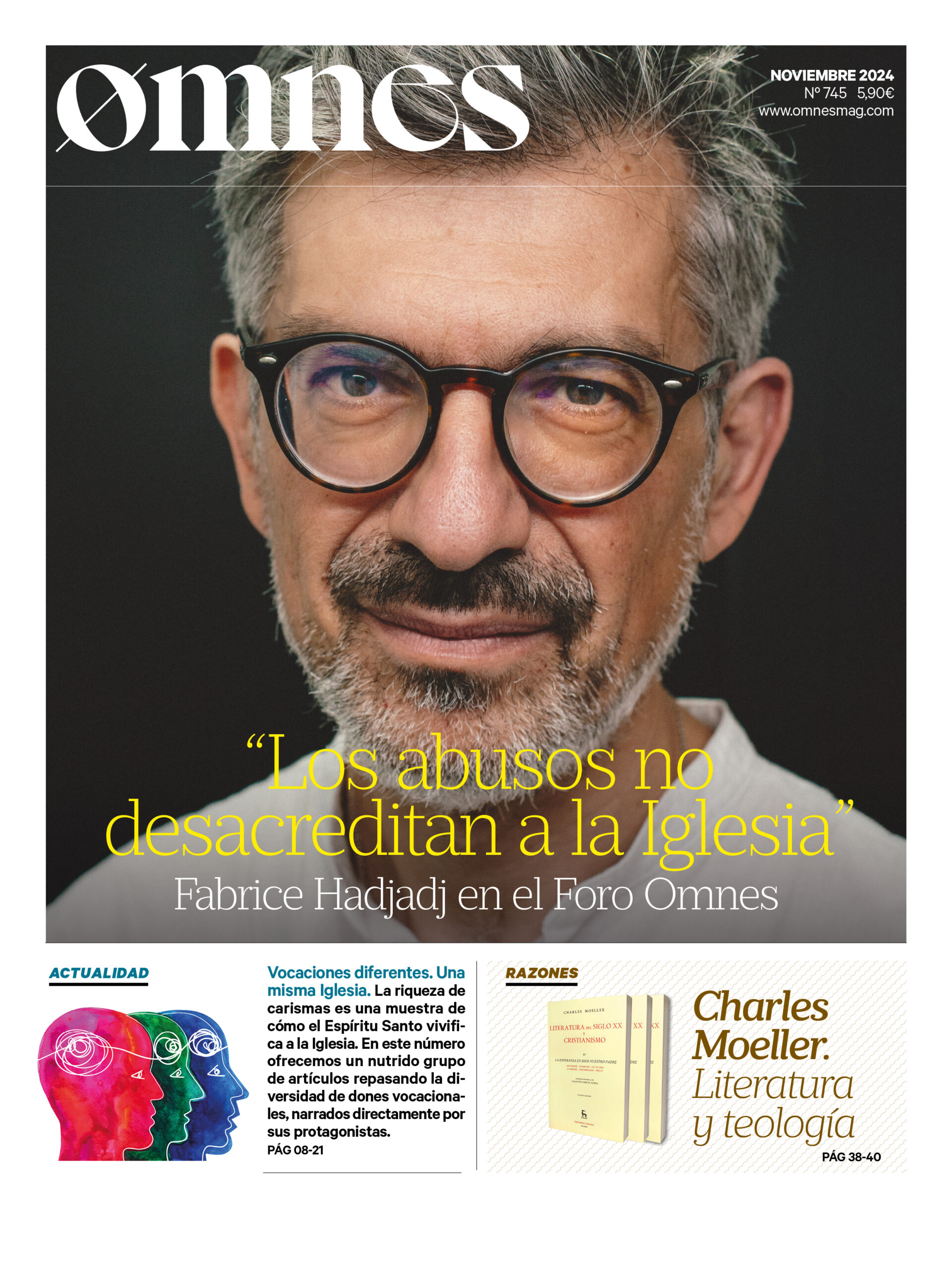If until now technology had been kept in a certain way as something external to man, nowadays it is no longer so; we have it inside us. Nano and biotechnologies, robotic systems are integrated into the nervous system by neuronal interface, have been introduced into the most intimate mechanisms of the person and are profoundly changing our way of living in the world and of being with others and with ourselves.
Even if the machine remains external to the human being, its current development is capable of determining human life more profoundly than ever before: just think of the presence of machines that are similar to us, whether in terms of their appearance (humanoid robotics), their ability to make decisions autonomously, or the socio-economic changes that will be brought about, for example, by the massive introduction of 3D printing (in three dimensions). And the key question is: is all this something negative, anti-human, or can we live the age of technology in the key of hope?
In this global environment that is increasingly conditioned by machines, it seems logical that many new questions are being raised that are not easy to answer, and that we are beginning to speak of "technoethics" as a way to reach an answer in the key of hope. In fact, various bodies in the world of technology, culture and politics are increasingly pushing for a rediscovery of the ethical dimension of technology.

A new science is born
The term "technoethics" was born a long time ago, in December 1974, during the "International Symposium on Ethics in an Age of Pervasive Technology", which took place in the prestigious Israel Institute of Technology (Technion) of Haifa. At that meeting Mario Bunge, an Argentinean philosopher who taught at the McGill University of Montreal (Canada), first used the term in an address entitled "Toward a Technoethics".which was subsequently published in "The Monist" in 1977.
The word was born, therefore, only four years after the word "bioethics", but it did not have the same success; it practically disappeared from the cultural map until it reappeared at the beginning of the 21st century.
Perhaps the author himself was to blame for this. In that conference, Bunge made statements that at that time represented great advances, such as declaring that the engineer or technologist has the obligation to face the ethical questions that his actions entail, without pretending to transfer them to managers or politicians. At that time, the engineer was seen as a kind of "specialized worker", capable of doing what the company or the politician asked him to do, but without being the one to decide what to do or what not to do, or whether it was a good thing to do.
But the formula that Bunge found to give this ethical value to the technical act spoiled everything. As a thinker imbued with modernity, with materialistic tendencies and a good connoisseur of the emerging technology, he probably thought that from an ethical point of view one could trust much more the machine, guided by science and computer algorithms, than the human person (for a modern person, from a functional point of view, the person is disappointing). That is why Bunge concluded his intervention by stressing that an upright and efficient conduct requires a revision, an overhaul of ethics, because it has to depend on technique and not on an unreliable human freedom.
Bunge's position is reminiscent of that of the pre-Hippocratic Asclepiadian physicians: their science depended only on the sacred books; what was written in them was what they followed; the ethical consequences of their acts did not fall on the physicians, but on the gods, who alone were responsible for the life or death of the patient. In the technoethics of modernity, the ancient gods have been replaced by science, which guides all consciences. The only problem is that today the guide of all sciences is, in turn, the economy; therefore, if something is good for the economy, it is good morally, and vice versa. Obviously, we are dealing here with an economy centered on the production of wealth, not on the person, as the semantic origin of the word actually suggests and Francis recalled in the Laudato si.
At the service of the individual
Hippocrates breaks with the asclepiadic tradition and makes medicine a true science: he destroys the sacred books and begins to study the symptoms and to experiment the efficacy of drugs. Since Hippocrates, to cure or to kill depends on the science and the technical capacity of the physician who, therefore, is ethically involved in the first person: that is why the physician swears that he will use his science only for the good of mankind. Hippocrates' science and technique are at the service of the person.
I believe that to have hope in the current technological civilization is to rediscover the true meaning of science and its orientation towards the global good of the person, and not only of its functions. In this sense, technoethics must be conceived in the opposite key to that of Bunge: technoethics must be an area of interdisciplinary dialogue between technologists and ethicists, leading to a body of knowledge and an ethical system of reference that allows the achievements of technology to become a central element in achieving the teleological perfection of the human being. This presupposes not only affirming the positive anthropological character of technology, but also placing the end of the person in something that goes beyond technology itself.
Babel versus Pentecost
The most classic example of the immanent finalism of technology is the biblical Tower of Babel. In that episode, men think that to reach heaven is to build a very high tower, without realizing that their attempt would lead them to be laying bricks one on top of the other for eternity: a sort of Sisyphus myth in a masonry version. Babel is the symbol of the technique of modernity: it is no coincidence that in the film MetropolisFritz Lang's "New Babel" (1927), the city of technical happiness revolves around a tower called "New Babel".
The man of Babel loses his symbolic capacity: self-reduced to an immanent purpose, he is able to communicate very well, but he loses human language, he is incapable of dialogue. His punishment, the confusion of languages, is not arbitrary: it is what is due to him for what he has done. Only when the Spirit of the Logos is given to him again (Pentecost) will he be capable of a true dialogue with all men, over and above the diversity of tongues. The opposite parallelism between Babel and Pentecost is the key to the hope of contemporary technology.
Modern man, who is the man of Neo-Babel, or the happy Sisyphus of Camus, or the indefatigable ant of Leonardo Polo..., cannot attain happiness. Modernity has died, giving way to postmodernity, among other things because it is already a common certainty - and not only the prediction of the great prophets of the crisis of modernity: Dostojevsky, Nietzsche, Musil... - that techno-scientific development will never succeed in answering the great mysteries of the human being: pain, guilt, death... A full human existence will never be achieved by adding more time. Let us remember that, for St. Thomas, hell is not true eternity, but only more time, indefinite time, a tick-tock that never ends (cf. Summa TheologiaeI q. 10, a. 4 ad 2um).
Technique won the battle
That is why the end of modernity has coincided with an enormous distrust of technology, which is seen as an enemy. A great cultural war has been fought against it: philosophers such as Heidegger and Husserl, the hippythe New AgeMuch of the art (unbelievable!: "art" is Greek for "art", "art" for "art", "art" for "art".tekné"; technique in Latin is said "ars") and literature have fought against technique..., and have lost.
Curiously, technology has won the cultural battle. As was said at the beginning, it now occupies a central place not only in society, but within the person himself. And it has won not only because it has imposed itself with its achievements, but for another more radical reason: the reduction of human reason to experimental scientific rationality has limited access to reality to knowledge of its laws of physical, chemical, biological and psychic behavior....
In the end, the fundamental model is given by physics, which is the modern "measure of all things", as was the Vitruvian man in the Florentine Renaissance: then everything was understood from anthropology, and in modernity everything is understood from physics (how not to think of the a priori Kantians of pure reason?).
The problem is that all this tends towards a paradigm of domination: to know the laws of reality in order to be able to subdue it. Modernity has thus originated an ecological crisis: the destruction of so many resources, the increase in the number of people living in the world, and the gap between rich and poor countries...
Basically, the problem is that modernity, as Scheffczcyk said, has replaced God with science and religion with technology. In the modern paradigm, technique ends up being the instrument of science, inverting a relationship that had always been the opposite. And postmodern man has rebelled against this. Who knows more about a rose: a botanist or a poet? That is why technology has won the battle, and even those who continue to attack technology do so by employing an infinity of technological artifices, and spread their ideas through the most sophisticated achievement of the technique of communication: the Internet.
Identification with the machine
What to do in the face of this paradox: is the technique that has won the cultural battle the subdued and violent technique of modernity, or is it the man-centered technique of classical culture and the Italian Renaissance?
The answer to this question cannot be given by the technique itself, because it alone does not determine itself to any end, it is always progress towards new achievements. The ordering to the end is given by the person. In a certain sense, the modern person has preferred to renounce the end (which is like renouncing freedom), in order to identify himself with the machine and thus participate in its many functional advantages. Faced with the crisis of modernity, those who do not want to renounce this way of seeing things have no other way out than to flee forward, further reducing the person to the machine: this is the path of the transhumanists or posthumanists, who are not postmodern but "tardomodern" (this is the terminology used by Pierpaolo Donati, very aptly). For them, the key to the human being lies in the recovery of the radical Cartesian dichotomy between res cogitans (mind, intelligence) and res extensa (bodies, matter), so that the res cogitans can subsist in any res extensaboth biological and artificial.
Posthumanists view the human body as something that, if necessary or convenient, can be dispensed with or subjected to extreme and arbitrary modifications. This position is not very different from that found in many aspects of late-modern culture, which sees the body as a mere instrument that we can modify to improve its performance: prostheses and modifications that make it more sexually attractive, or more suitable for achieving certain professional or sporting performances, or that could make the human body a branded body, a "branded" body.branded body" (Campbell). It is curious that in the same year that Pistorius got permission to compete in the "normal" Olympics, one of the best known international bioethics journals published an article stating that there are no moral reasons to prevent voluntary mutilations or extreme body modifications (Scharmme in Bioethics2008); if a robotic prosthetic leg can lead me to sporting glory better than my natural one, why not replace it? Then, only amputees would participate in the finals of the 2022 Olympics.
Main technoethical principles
One might think that progress that allows such things is not worthwhile. On the other hand, we should affirm that we cannot renounce this technological progress, which is a true conquest of the human spirit.
It is clear, however, that something has to change. The proposal of the new technoethics is that we must change the modern paradigm that affirms the primacy of science over technology and disassociates it from freedom for a new model in which technology once again becomes a spiritual activity, an eminent product of the spirit in its relationship with matter. Basically, it is a matter of rediscovering the anthropological value of the body that we are.
The key to the true meaning of technology lies in discovering its role in the relational being of the person, already described by Aristotle as the teleological element of human happiness ("no one would want to live without friends"). This is highlighted in our postmodern days by the need to overcome the paradigm of dominion with a new relational paradigm. The person, who realizes himself in the interpersonal relationship by sharing the intentional ends of intellect and will, knows that the substantial unity of soul and body cannot carry out this task without accepting its material dimension. Interacting with matter (human labor) in order to insert it fully into the interpersonal dialogue is the ultimate reason for technique.
It is necessary to replace the objectifying and dominating technoscience, which subordinates technology to a secondary role, with a new concept of science open to the authentic truth of man and conscious of not being able to reach that truth, but capable of putting itself at his service through technology. Therefore, it can be said, as the first theorem of technoethics, that technology has as its own object the increase of the relational capacity of the person. From this we can deduce the second theorem: experimental science is humanized or spiritualized when it becomes technique, because it reaches the person. And if these two theorems are fulfilled, it is possible to postulate a third: the authentic development of technology leads to the exaltation of the person, so that the technological artifice, the machine, which when it is born usually has a bulky presence, ends up being integrated and taken for granted. The more perfect a machine is, the more the human person is hidden behind it, behind its task and its true purpose.

Naturally artificial
The crisis of modern culture has led us to establish a kind of axiom whereby what is natural is good, and what is artificial is bad. The truth is exactly the opposite. There is no opposition in human nature between natural and artificial: we are "naturally artificial". Who dares to say that a myopic person is less natural with glasses than without them? A proper view of technique should lead one to see the artificial element as the product of the free interaction of the person with material reality and, therefore, as something that creates dialogue. On the one hand there would be the artifices (machines) that are mere utensils, or evolved mechanisms of assistance to human life (robotic prostheses, neuroprostheses...), and, on the other hand, the artifices that increase the symbolic capacity of the person (communication and information technologies).
These general principles that I have enunciated, but not sufficiently developed due to the logical lack of space, can serve as a guide to judge from an ethical point of view when a new technology serves the person or not. The most evolved robotic systems can already be connected to the nervous system of living beings, creating a synergy between machine and person that can lead not only to repair lost functions, but also to increase others to unthinkable limits. The same can be said of neuroprostheses.
Humanoid robotics can enable symbolic manifestations that art until recently could not dream of. New technologies serve freedom. This means that they can also go against humanity: a robotic system can condition the physical action of a person against his will, a neuroprosthesis can enslave a personal being. Hence the importance of returning to the ethical key of technical creation, which will always make it possible to discover the person behind the machine. When we contemplate the Sistine Chapel, the matter of the fresco puts us in dialogue with Michelangelo; when we come into contact with a humanoid, we will be in dialogue with the engineer who created it.
Professor of Moral Theology at the Pontifical University of the Holy Cross and an expert in technoethics.








